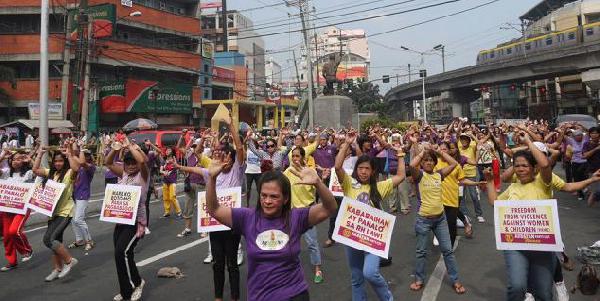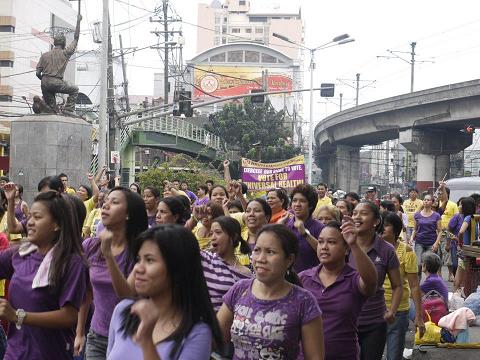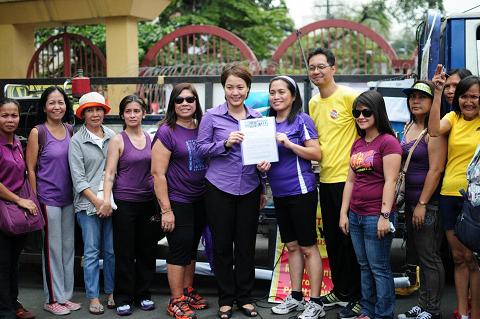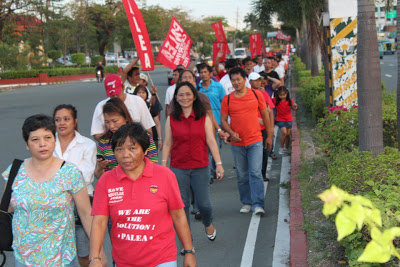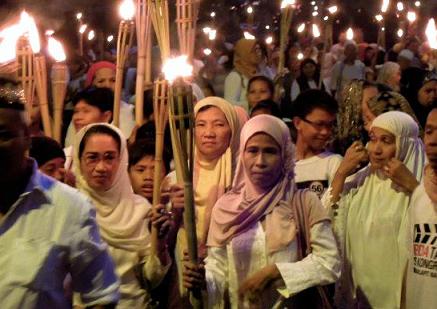By Alliance of Progressive Labor (APL)
IN AN EXCEPTIONALLY rare coincidence, the country’s organized women will celebrate not one but three “victories” that were successively achieved a few months before today’s observance of the International Women’s Day (IWD).
While delighted with the ratification of the “Domwork” Convention and the enactment into law of erstwhile “Kasambahay” and RH bills – which all happened in a span of five months, excluding the decades of campaigns to legislate them – the Sentro ng mga Progresibong Manggagawa (Sentro)-Women cautioned that there should be no let up in the struggle for gender equality and women empowerment.
The Alliance of Progressive Labor (APL)-Women added that these landmark laws are still not perfect and must be guarded from violators and even “saboteurs.”
“For instance, the RH Law, despite already been passed by both the House and the Senate and signed into law by Aquino, is still being questioned through obviously concerted petitions in the Supreme Court,” the APL-Women said.
Sentro-Women likewise deplored the “absurd, desperate and bigoted” moves of a few ultraconservative elements in using religion not only to oppose the candidates in the May elections who backed the then RH bill, but also by grouping the latter into “Team Patay” (death).
“It’s as if those who disagreed with the RH bill have the monopoly to the ‘pro-life’ tag, which is actually one of the values being adhered to by the RH Law,” the women trade unionists from Sentro lamented.
The women union members acknowledged that women – home-based or domestic workers inside the country and abroad, mothers, wives, etc. – will primarily benefit from the said three laws that were only recently approved.
Women comprised the overwhelming majority of the estimated half a million Philippine domestic workers who work mostly in Hong Kong, Singapore, Malaysia, and the Middle East, particularly in Saudi Arabia, United Arab Emirates, Kuwait, Lebanon, and Jordan; as well as those almost 2 million working inside the country.
Issues and concerns on reproductive health and functions have of course been centered on women, and they comprise at least the “better half” of parenthood.
The “Domwork” (or Domestic Work) Convention of the International Labor Organization – formally, Convention No. 189 (C189) or the Decent Work for Domestic Workers – was passed during ILO’s 100th International Conference in Geneva on June 16 last year. The Philippine Senate promptly ratified it the following Aug. 6, making the country the second in the world, after Uruguay, to do it.
Its “local counterpart,” the “Kasambahay” Law, after getting bicameral nod in Congress, was signed by President Aquino on Jan. 18 this year becoming Republic Act No. 10361 or An Act Instituting Policies for the Protection and Welfare of Domestic Workers.
The highly contentious RH bill, after about 12 years in four Congresses, was finally approved by both Houses in the outgoing 15th Congress and signed by Aquino last Dec. 21 as RA 10354 or theResponsible Parenthood and Reproductive Health Act of 2012.
Sentro and APL lauded their affiliate organizations, especially the women members, as well as the many other mass organizations and NGOs that provided the crucial and relentless “outside” support for the lawmakers who sponsored or voted for the said three groundbreaking laws.
http://www.apl.org.ph
__________________________________________________________________________
Women advocates hold exercise routine, call for universal health care, defense of RH law
By AKBAYAN (Citizens Action Party)
In celebration of Women's Month and the International Women's Day, Akbayan Party-list urged the Filipino women to exercise their right to vote by supporting candidates who genuinely push for pro-women, pro-health policies.
Wearing purple shirts and yellow headbands, five hundred Akbayan women advocates did a synchronized exercise routine to highlight universal healthcare as an important election issue.
"The women's vote will be crucial to electing legislators who will institute a universal healthcare program in the country," Akbayan women leader Guy Claudio said.
"The Filipino women must build on their success with the passage of the RH law. They must exert their political influence this election to push candidates to ensure healthcare programs are expanded by carrying out a universal healthcare platform to provide comprehensive 'social health protection' to Filipinos," Claudio said.
Akbayan highlighted four important aspects of a universal healthcare policy namely; 1) doctor in every barangay, 2) free hospitalization and medicine for all, 3) capacity-building for barangay health workers and 4) barangay health education.
Health reform, important component of anti-corruption
Claudio, who is also the director of the UP Center for Women's Studies, said health reform is an essential component of the people's anti-corruption drive.
'The most visible proof of government mismanagement and corruption are underfunded hospitals, outdated medical facilities, and lack of public investment in healthcare in general. Thus, one of the best ways to ensure that the dividends generated by the people's anti-corruption drive are felt by the public
Vote to defend RH law
Claudio also said women should use the elections to choose leaders who will defend the Reproductive Health (RH) law in Congress.
"Women must use the ballot to elect legislators who will defend the RH law by ensuring that appropriate funding is provided to the measure," Claudio said.
"We must foil the attempts by those who wants to reduce the law into an unfunded mandate and bring us back to a time when we enjoyed little or no recognition of our reproductive health rights," Claudio added.
Women hit Zubiri, say anti-RH stance clashes with universal health care
Claudio also chided candidates who are claiming to support universal healthcare to get elected but have shown a track record of opposing against RH. She identified current senatorial candidate Migz Zubiri as stridently opposed to the RH law but is claiming to champion universal healthcare.
"The concept of universal healthcare embraces reproductive health rights. Being anti-RH and pro-universal healthcare is not only contradictory, it's outright deception," Claudio explained.
"Nandadaya na naman si Zubiri ngayong eleksyon. If he thinks he can get away with it then he should know that the people will not forget his track record on RH," Claudio added.
The women advocates concluded the event by handing over a letter addressed to President Benigno Simeon Aquino III urging his government to start the process of developing a universal health care policy. The letter was received by Director Anna Guerra of the Office of the Presidential Adviser for Political Affairs.
The letter urged the Aquino administration to sustain the momentum it generated with the passage of the RH and the Sin tax laws.
"If 2012 was the year of the RH and Sin tax laws then 2013 should be the year of universal healthcare," according to Claudio.
Claudio said that universal healthcare was the logical continuation of the RH law and other health reform laws.
https://akbayan.org.ph
__________________________________________________________________________
Militant labor kick-off Women’s Day at DOLE with rally vs. “economic abuse”
By Partido ng Manggagawa (Labor Party - Philippines)
Women members of Partido ng Manggagawa (PM) and Philippine Airlines Employees Association (PALEA) held a picket-rally this morning in front of the Department of Labor and Emplyoment (DOLE), Intramuros, Manila. The activity highlighted the economic and labor demands of women workers.
The abuse of women, physical and otherwise, is a major theme of the worldwide commemoration of women’s day. The rallyists brought makeshift chains bearing the major economic demands of women. The women workers also partook of a boodle fight of tuyo to highlight the grave poverty and double burden of working women.
Among the economic burdens of women raised during the activity are the lack of job opportunities for women, outsourcing and contractualization as experienced by PALEA, and high prices of basic commodities and services like water and electricity.
Filipino women’s Labor Force Participation Rate (LFPR) has remained within the 50% mark. This is not because women chose to remain at home as so-called “plain housewives’ but rather due to lack of opportunites. Regular jobs have been dwindling for decades and contractualization has become the norm. “Sa hirap ng buhay at kakarampot na sweldo, walang babae ang gustong manatili sa bahay para mag-abang ng iintregang sweldo ng kanilang mga asawa tuwing kinsena. Women find no pleasure in that,” asserted Partido ng Manggagawa Secretary General Judy Ann Miranda.
She added that it is more difficult for women to make ends meet unemployed. “Syempre, mas makakatulong kung parehong may regular na trabaho dahil sa Pilipinas ‘buy 1-take 1’ ang pamilyang manggagawa para kitain ang sweldong sasapat sa kanyang pangangailangan sa isang araw.” With current prices of basic commodities and services, a family of six needs at least P1,000 a day to live decently. The minimum wage has remained more or less half of that amount.
In celebration of International Women’s Day, women workers’ demands remain:
1. Regular jobs and a living wage
2. Quality social services (e.g. housing, health and education)
3. Low-priced basic commodities, water and electricity
4. Rights and protection for women
After this activity, PM and PALEA women members will be participating in women’s groups activities on anti-violence against women tomorrow.
www.partidongmanggagawa2001.blogspot.com



